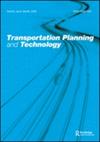Does docked bike-sharing usage complement or overlap public transport? the case of Brussels, Belgium
IF 1.8
4区 工程技术
Q3 TRANSPORTATION SCIENCE & TECHNOLOGY
引用次数: 0
Abstract
ABSTRACTThis paper complements the existing literature on Bike Share Schemes (BSS) by investigating their use from a spatiotemporal perspective to assess their relationship with public transport (PT). We address these questions through the case of Brussels and its long-standing docked BSS ‘Villo!’. Our study analyses comprehensive (consecutive 12 months) and disaggregated (station level) data on rentals and returns and finds that Villo! is used mostly in dense (although not all) districts also well served by PT. However, temporal structures suggest Villo! overtakes PT at night in vibrant districts and possibly in selected districts with lower PT services over weekends. In addition, Villo! stations at key PT hubs usually do not show specific temporal patterns, which suggests intermodality may work at all times during PT operations. There could be an evening peak effect combined with the Brussels’ topography, but this needs to be confirmed by on-site surveys.KEYWORDS: Bike-sharingpublic transportspatiotemporal analysisprincipal component analysis AcknowledgmentMichał Dzięcielski gratefully acknowledge the computational grant from the Supercomputing and Networking Center (PSNC) in Poznań, Poland.Disclosure statementNo potential conflict of interest was reported by the author(s).Notes1 In Brussels, the ‘premetro’ is an underground-like infrastructure operated by tramways that ride both underground and in the streets.2 JCDecaux API, https://developer.jcdecaux.com/#/home (Accessed 22.04.2023).3 The monthly patterns of Villo! ridership could not be investigated because the period of the investigation was disturbed by post-pandemic recovery and thus increasing usage over time.4 Mathematically speaking, for each PC the statistical package computes the linear correlation between the supplementary variable and the scores.5 We argue that the value of a bike is proportionally higher for a poorer household than for a privileged one.6 This amount is not debited but must be available for the case rules would not be respected.共享单车的使用是对公共交通的补充还是重叠?比利时布鲁塞尔的案例
摘要本文从时空角度考察了共享单车与公共交通(PT)的关系,对现有文献进行了补充。我们通过布鲁塞尔及其长期停靠的BSS“Villo!”来解决这些问题。我们的研究分析了综合(连续12个月)和分类(车站级别)的租金和回报数据,发现Villo!主要用于人口密集(尽管不是全部)的地区,这些地区也有很好的PT服务。然而,时间结构表明Villo!在繁忙的地区和可能在周末PT服务较低的特定地区,夜间超过PT。另外,Villo!关键PT枢纽的站点通常不显示特定的时间模式,这表明多式联运可能在PT操作期间的任何时候都有效。布鲁塞尔的地形可能会产生晚峰效应,但这需要通过现场调查来证实。关键词:共享单车、公共交通、时空分析、主成分分析致谢michaowDzięcielski感谢来自波兰波兹纳斯的超级计算和网络中心(PSNC)的计算资助。披露声明作者未报告潜在的利益冲突。注1:在布鲁塞尔,“premetro”是一种类似地下的基础设施,由地下和街道上的有轨电车运营JCDecaux API, https://developer.jcdecaux.com/#/home(访问日期:22.04.2023)Villo!由于调查期间受到大流行后恢复的干扰,因此随着时间的推移,使用情况有所增加,因此无法对客流量进行调查从数学上讲,对于每个PC,统计包计算补充变量和分数之间的线性相关性我们认为,一辆自行车对贫困家庭的价值要高于对特权家庭的价值这笔款项不记入借方,但必须可用,以防规则不受尊重。
本文章由计算机程序翻译,如有差异,请以英文原文为准。
求助全文
约1分钟内获得全文
求助全文
来源期刊

Transportation Planning and Technology
工程技术-运输科技
CiteScore
3.40
自引率
6.20%
发文量
24
审稿时长
12 months
期刊介绍:
Transportation Planning and Technology places considerable emphasis on the interface between transportation planning and technology, economics, land use planning and policy.
The Editor welcomes submissions covering, but not limited to, topics such as:
• transport demand
• land use forecasting
• economic evaluation and its relationship to policy in both developed and developing countries
• conventional and possibly unconventional future systems technology
• urban and interurban transport terminals and interchanges
• environmental aspects associated with transport (particularly those relating to climate change resilience and adaptation).
The journal also welcomes technical papers of a more narrow focus as well as in-depth state-of-the-art papers. State-of-the-art papers should address transport topics that have a strong empirical base and contain explanatory research results that fit well with the core aims and scope of the journal.
 求助内容:
求助内容: 应助结果提醒方式:
应助结果提醒方式:


